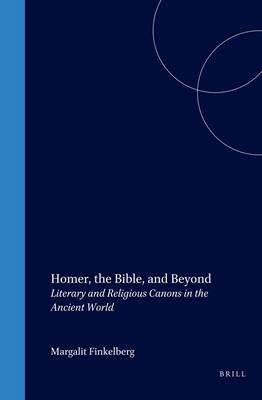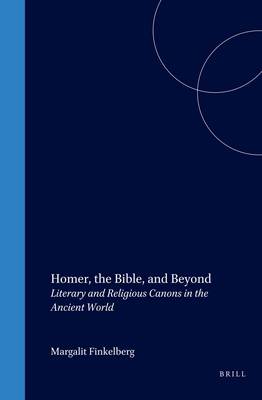
Bedankt voor het vertrouwen het afgelopen jaar! Om jou te bedanken bieden we GRATIS verzending (in België) aan op alles gedurende de hele maand januari.
- Afhalen na 1 uur in een winkel met voorraad
- In januari gratis thuislevering in België
- Ruim aanbod met 7 miljoen producten
Bedankt voor het vertrouwen het afgelopen jaar! Om jou te bedanken bieden we GRATIS verzending (in België) aan op alles gedurende de hele maand januari.
- Afhalen na 1 uur in een winkel met voorraad
- In januari gratis thuislevering in België
- Ruim aanbod met 7 miljoen producten
Zoeken
Homer, the Bible, and Beyond
Literary and Religious Canons in the Ancient World
€ 84,62
+ 169 punten
Omschrijving
As distinct from the extant studies of ancient canonical texts, which focus either on literary (Greco-Roman) or religious (Judeo-Christian) canons, the present volume aims at bridging between these two fields by proposing the first comparative study of canon.
An international team of experts discusses the processes of canon-formation in societies of the ancient world, addressing such issues as canon and the articulation of identity; the hermeneutical attitude toward canonical texts; textual fixity and openness; oral and written canons; methods of transmission, and more. Among the topics discussed are Mesopotamian canons; Zoroastrianism; the Bible; Homer; literary and philosophical canons in ancient Greece and Rome; the New Testament; the Roman law; Rabbinic Judaism and Kabbalistic literature.
The future of the so-called Western Canon is one of the most hotly debated issues of the day. There is reason to believe that what is perceived today as a unique crisis, can be put into perspective by students of ancient societies, for the simple reason that the ancient world offers us the historical perspective of civilizations as a whole and allows us to study cultural phenomena in the longue durée.
Contributors include: Niek Veldhuis, Steven Chapman, Cristiano Grottanelli, Shaul Shaked, Margalit Finkelberg, Hayden Pelliccia, Hubert Cancik, Amiel D. Vardi, Guy G. Stroumsa, Christoph Markschies, Robert Lamberton, Hagith Sivan, David Stern, Moshe Halbertal, and Andrew Plaks.
An international team of experts discusses the processes of canon-formation in societies of the ancient world, addressing such issues as canon and the articulation of identity; the hermeneutical attitude toward canonical texts; textual fixity and openness; oral and written canons; methods of transmission, and more. Among the topics discussed are Mesopotamian canons; Zoroastrianism; the Bible; Homer; literary and philosophical canons in ancient Greece and Rome; the New Testament; the Roman law; Rabbinic Judaism and Kabbalistic literature.
The future of the so-called Western Canon is one of the most hotly debated issues of the day. There is reason to believe that what is perceived today as a unique crisis, can be put into perspective by students of ancient societies, for the simple reason that the ancient world offers us the historical perspective of civilizations as a whole and allows us to study cultural phenomena in the longue durée.
Contributors include: Niek Veldhuis, Steven Chapman, Cristiano Grottanelli, Shaul Shaked, Margalit Finkelberg, Hayden Pelliccia, Hubert Cancik, Amiel D. Vardi, Guy G. Stroumsa, Christoph Markschies, Robert Lamberton, Hagith Sivan, David Stern, Moshe Halbertal, and Andrew Plaks.
Specificaties
Betrokkenen
- Uitgeverij:
Inhoud
- Aantal bladzijden:
- 290
- Taal:
- Engels
- Reeks:
- Reeksnummer:
- nr. 2
Eigenschappen
- Productcode (EAN):
- 9789004126657
- Verschijningsdatum:
- 25/04/2003
- Uitvoering:
- Hardcover
- Formaat:
- Genaaid
- Afmetingen:
- 168 mm x 248 mm
- Gewicht:
- 612 g

Alleen bij Standaard Boekhandel
+ 169 punten op je klantenkaart van Standaard Boekhandel
Beoordelingen
We publiceren alleen reviews die voldoen aan de voorwaarden voor reviews. Bekijk onze voorwaarden voor reviews.








